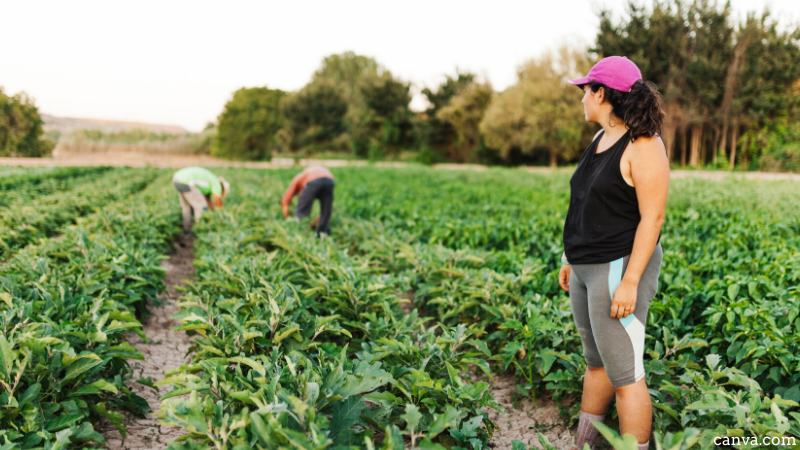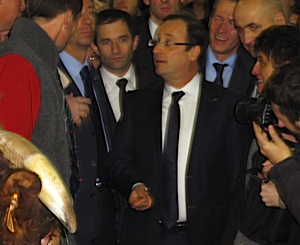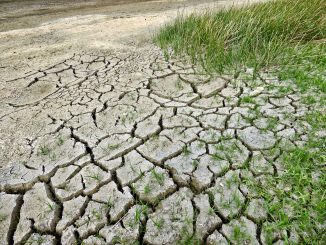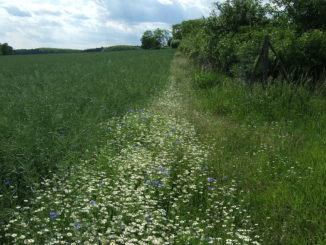Over 100 organisations including trade unions, NGOs, and organisations representing small farmers have signed an open letter highlighting the need for social conditionality in the next CAP. Unsurprisingly the major farming organisations in Europe have not signed the letter. But how are labour standards on smaller farms at the ecological end of the spectrum? The picture isn’t always rosy, as Brendán Ó Conchúir find out, though there are some tentative solutions emerging.
What is social conditionality, and what would it mean on European farms? Social conditionality would mean including the conditions of farm labourers in the basic rules and payments of CAP. It would mean creating a CAP which is intended to deliver for agricultural workers as well as for farmers, an important measure for all those who want a fair CAP. While farming organisations are understandably vocal on the need for CAP to keep farmers on the land, the right of farm workers to decent working conditions has never featured prominently in CAP debates.
CAP Reform | Broad Coalition Demands Social Conditionality For A Fairer CAP
The need to address farm workers’ rights has been highlighted in this broad-based initiative to bring social conditionality into CAP, which ARC2020 and100+ other organisations have worked on recently (see link above). This campaign has developed some traction, with the Commissioner Wojciechowski acknowledging its importance of it recently – a clear sign of the impact of the multi-organisation campaign.
2020 saw workers conditions come to the fore, with covid19 underscoring the plight of those in meat processing and also of farm workers, particularly migrant workers in the horticulture sector. Headlines were made around Europe when Covid19 travel restrictions created a barrier to the recruitment of seasonal migrant workers for Europe’s horticultural sector.
The vital role of this group of largely unseen, seasonal migrant workers from Europe’s periphery in our food supply chains was laid bare as was their often substandard working conditions. While this is not the first time the treatment of farm workers in Europe has made headlines, the plight of migrant farm workers in the Mediterranean has become one of the worst kept secrets of modern agriculture: political action on the issue is nevertheless slow.
The large (and often conservative dominated) farmers organisations and many of Europe’s agricultural ministers have voiced their opposition to social conditionality, seeing it as more red tape that creates another unnecessary burden for farmers. In fact Ministers from Austria, Belgium, Bulgaria, Croatia, Cyprus, Czech Republic, Finland, Greece, Hungary, Latvia, Malta, Romania and Slovakia proposed an amendment to this effect February 23rd.
(See Interinstitutional File: 2018/0216(COD))
This idea has, however been refuted by level-headed policy analysts like Alan Matthews (see tweet below) who sees it as quite a basic standard to aim for, one likely to be introduced in a proportional manner.
Like with issues such as protecting biodiversity and reducing chemical use there has been dissent from Europe’s small farmers such as those represented by the ECVC-European Coordination Via Campesina.
Not just an issue for the big boys
It is understandable that the farmers concerned with environmental and economic sustainability also understand the need to respect the rights of workers employed by European farmers, and while it may be tempting to view worker exploitation as an issue associated with large conventional farms who after all account for the vast majority of farms employing paid workers, this would be a simplification.
Among the organic and broadly ecologically minded farming sector the question of what would social conditionality mean also needs to be addressed. This is a sector that has seen real growth in many parts of Europe in recent years as a growing number of consumers embrace local and sustainable food production and will likely continue to expand as more people embrace the need for more sustainable farming.
However it is also a relatively more labour intensive way of farming as the management of grazing land and production of fruit and vegetable crops with less or no chemical inputs requires more labour than conventional agriculture, as does the added work that comes with farmers selling their produce directly to customers.
Yet the premium on prices for organic or sustainably produced food is often not enough to cover the extra labour required. Nor is the patch work of small farms who are often at the low end of CAP payments, or excluded entirely, conducive to the economies of scale that can easily afford the added wage bills of even part time farm workers.
Until now this issue has not been paid much attention, partially as a result of the diffused nature of these small farms which occupy a small niche in the agriculture sector. However the economic constraints built into a sector that consists of a large number of small producers often competing for the same customers has created its own unanticipated limits to scaling growth and market share. Meaning that the sustainable food sector has not developed with sustainability in terms of adequate protection for workers or indeed the economic growth needed to pay workers built in.
Instead a certain amount of free labour has come to be a characteristic of a sector, as wwoofing has long been a popular part of the sector and lately longer unpaid farm ‘internships’ have emerged. This is perhaps unsurprising, as there has been a steady stream of idealistic new entrants willing to exchange labour for the ability to learn or to travel despite receiving little or no pay for their efforts.
While unpaid internships do happen in other industries, it’s rare to find people milking cows day in day out just for the experience. In particular, the working conditions of migrant labourers in the Mediterranean horticulture sector is hardly the type of labour you would be able to convince someone to volunteer to do for free, much less economically vulnerable people such as migrant workers.
Herein lies the emerging difficulty for this sector, as it grows – and we all hope sustainable human scale farming continues to grow: there will be a greater need for labour, and a need to recruit from beyond the labour pool of willing idealists happy to work for room, board and some learning. Yet if the economic conditions in the sector stay the same the ability of farms to grow will be severely limited if that growth model includes the contribution of unpaid labour.
What do interns get in small scale horticulture?
A number of farmers I have spoken to who use an unpaid internship program to provide labour have highlighted the ‘free’ accommodation and education they provide in exchange. Some describe it as a mutually beneficial arrangement whereby the farm has been able to grow despite economic constraints and the ‘interns’ have gained valuable knowledge for ‘free’. While some farms see no issue with using unpaid labour in this way others have stressed that the need to increase production left them no other option and that they intend to utilise paid labour as soon as its economically viable.
The possible introduction of social conditionality to CAP makes this issue more pressing. If one of the aims of conditionality is fair working conditions, then surely months long unpaid ‘internships’ fall well outside of the scope of what would be considered fair working conditions regardless of the educational aspect.
The issue in this is not that individual farms set out to exploit free labour, but that as some farms using such an internship have stated the workload needed to expand is simply beyond the ability of the farmer themselves but the profitability is not enough to cover the wages of an employee, even on minimum wage.
Examples from Ireland
Some farms in Ireland have participated in the Organic Growers of Ireland’s farm internship program which is supported by the Department of Agriculture and offers paid internship positions on farms, with a set programme and minimum wage provision. However, this program is still relatively small with only 9 or 10 internships per year and while the Department of agriculture pays for the educational aspect and the overall running of the scheme it is the farms themselves that pay the interns.
A more novel solution is that of Cloughjordan Community Farm who have for the past number of years been a participant in the European Solidarity Corps program, through which the farm has been able to have a number of EU funded volunteers who live, work and learn there for a year. Cloughjordan Community Farms ownership model as a farm made up of consumer members in a cooperative, which has allowed them to meet the criteria for participation in the European Solidarity Corps under the heading of ‘encouraging democratic participation’. This is something very few farms could replicate at present, as the dominant ownership model tends to be private ownership only differing from conventional agriculture in scale.
Solutions
How then does the sector address this problem? There is already a premium price paid for organic and local produce however if this alone is not sufficient for many small farmers to expand and grow while affording the costs of paid labour the ability of the sector to seriously challenge conventional agriculture is limited.
Paid farm internships such as that ran by Organic Growers Ireland, and creative uses of EU funds such as Cloughjordan community farm utilising the solidarity corps programme offer some examples of directions to take. But ultimately the labour needs of the entire sector, and its ability to comply with potential social conditionality rules in future CAP programmes needs to be examined by both those within the sector, and by government departments. There is a real need ensure environmental sustainability in farming is intertwined with economic sustainability for farmers and labourers.
It is worth finding the funding mechanisms to revitalise paid farm apprenticeships, tailored to ecological farming because of the public good they provide. Organisations like ECVC have suggested what could be a game changer – CAP basic payments based on the labour units employed rather than the area of land owned in a past reference year. This would especially support mixed, agroecological horticultural production: some of the bigger mixed organic horticultural holdings in the OGI apprenticeship scheme, for example, employ 20+ people on 30 or so hectares. While 30 hectares is slightly smaller than average farm in Ireland, which might employ one, two or maybe three people, 30 hectares is big by Irish standards for organic horticulture. This approach – labour over land area – or a hybrid of the two, with strong social conditionality rules, would have the potential to rejuvenate rural Ireland, and indeed rural Europe: where depopulation in some places, from Spain to Scandinavia, can be chronic.
Until then, labour remains a tricky topic, and, in many cases, a source of exploitation on too many smaller farms that use ecological methods.
The Netherlands | Are Agri-Food Workers Only Exploited in Southern Europe?
Covid19, Meat Processing Plants and the Limits of the Intensive Farming Model
Coping with Covid19 – Tensions in Farming, Trade and the EU Institutions
Brussels | Farmers, Environmentalists tackle EU-Mercosur Deal








